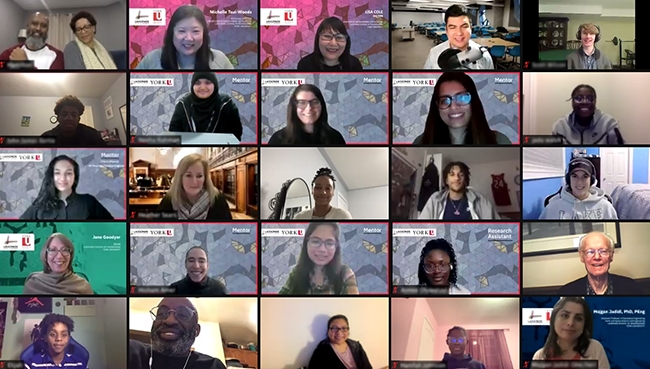The Kindergarten to Industry (K2I) Academy at York’s Lassonde School of Engineering is hosting a brand-new initiative starting this month called the Helen Carswell STEAM Program.
Through this program, 25 Black and Indigenous high school students from the York Region will participate in a 14-week paid research opportunity, and gain in-depth experience and mentorship in projects related to engineering, computer science, earth science, and/or atmospheric science.
“Our goal is to alter the pipeline of students pursuing careers in engineering and science to increase diversity in the industry,” says Lassonde Dean Jane Goodyer. “The Helen Carswell STEAM Program for Black and Indigenous Youth is a ground-breaking initiative from our K2I Academy that is providing opportunities for underrepresented groups to explore pathways in STEM (science, technology, engineering, and mathematics).”
The Academy’s main goal is to connect youth, educators, and communities with experiences in STEM, with a focus on diversity, equity, and inclusion. Their hope is that the programs can assist in addressing systemic barriers and provide opportunities to those underrepresented in STEM, such as women, as well as Black, and Indigenous youth.
“The K2I Academy is committed to building sustainable, equity-focused programs that strive to diversify the STEM profession – kindergarten to industry,” says Director of Programming Lisa Cole.
Throughout the program, the students will work as research assistants on projects with guidance from undergraduate students, who will serve as research assistant mentors. The mentors will assist the students in exploring a variety of concepts, including how science and mathematics can be applied to solve real-world problems. The K2I Academy has partnered with The York Region District School Board (YRDSB), and upon successfully completing the program, students will also earn a high school co-op credit.
The range of projects students are working on is diverse, including topics like “How might we create innovative technologies to reduce inequalities?” and “How might we use data analysis for sustainable water management?”
Cole highlights some of the skills students are developing and building through participation in these projects.
“Students are learning many skills including research, collaboration, communication, and creativity, and are obtaining experience in engineering design, computational thinking, and coding,” says Cole. “They are exploring the role that engineering, computer scientists, and scientists have in tackling real-world societal challenges connected to the UN Sustainable Development Goals.”
Initiatives like the Helen Carswell STEAM program do not exist in a vacuum — instead, Cole describes it as a “community effort.”
“The design and implementation of this work is only possible when York comes together to take action. We are so thrilled to work closely with Randy Pitawanakwat, manager of the Centre for Aboriginal Student Services, who is a key advisor for this program,” she says. “We have community partners through the BYTES Network and STEM Hub who have also played a critical role in making this program possible.”
The program is also an opportunity for Lassonde undergraduate students to experience the unique benefits of mentorship.
“As our undergraduate student mentors work alongside high school students, we are also supporting the development of future leaders and STEM/STEAM leaders who develop skills in project management, communication, collaboration, and leadership — creating equity-focused programming that inspires future innovators, problem-solvers, and creators,” adds Cole.

